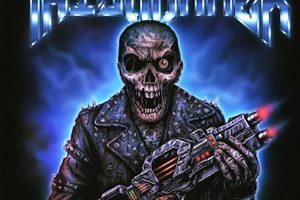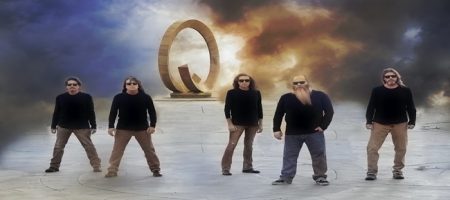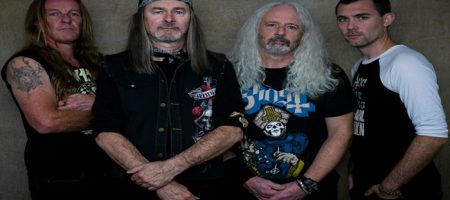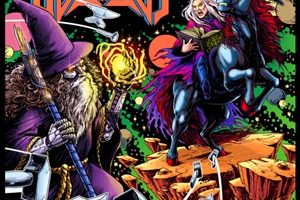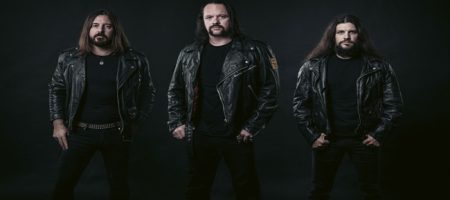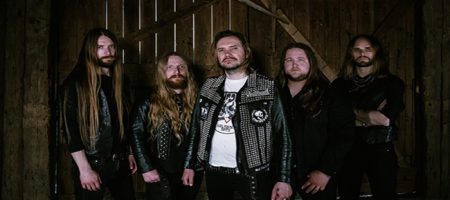H.E.A.T. – Rising with Force
Thursday, 28th July 2022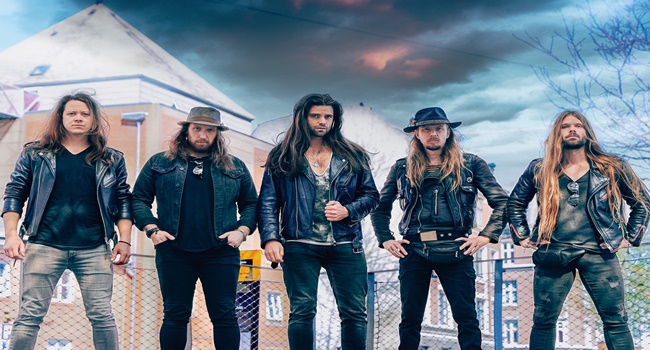
Proving that quality melodic hard rock and heavy metal doesn’t have any expiration date, H.E.A.T. are one of the premiere artists resurrecting the love of these styles over the past couple of decades. Reuniting with original singer Kenny Leckremo for their latest album Force Majeure, people who love those undeniable melodies, hooks, harmonies, and catchy songs will have plenty to sink their teeth into through this material. We reached out to Kenny via Zoom for a thorough 40 minutes plus chat about the new record, his feelings getting a second chance with the group, vocal mentors, thoughts on the state of rock/hard rock today, learning lessons from opening for bigger acts, his love of ice hockey and the parallels with music, plus insight into future touring plans.
Dead Rhetoric: You’ve been back in H.E.A.T. now since the fall of 2020. Discuss your original decision to leave the band the first time – and what changed or evolved in your life to give this a second go around, are you thankful for this second opportunity?
Kenny Leckremo: Yes. First of all, I can just say that for someone like me to be given a second chance like this to be something that I was a part of to start, when you put together a band, there are so many different things that have to come together at the same time. I think it also, we have a song called “A Shot at Redemption”, and that’s basically what it is. Furthermore, it’s an opportunity for me to step out of my own shadow, which I lived in for so many years.
When I took the first decision to leave the band for personal reasons, it was health related but I also had the sense that I didn’t have the motivation or the drive. I felt like my guys in the band, they deserved something better, they needed to keep the flame alive, to keep progressing and moving on. I felt like at the time it was the best I could do for the guys. Whether it was the best, I don’t know. One thing is for sure – we are incredibly lucky that the guys got ahold of someone as good as Erik Grönwall. He’s an amazing guy, personality-wise, and a hell of a singer to be able to bring them to where they are now. Of course, it’s an honor to be asked to return and to carry on. Hopefully and fortunately, for what the legacy will be.
Dead Rhetoric: The latest album for H.E.A.T. is Force Majeure. Where do you see this set of material and record sitting in the catalog of the band? Would you say you set the bar very high in terms of what you want to achieve with the songwriting and performances?
Leckremo: I think when we first got back together, we immediately started writing new material together. We wanted to be as good as we could be at the time. Like the title describes Force Majeure, it really has been a force majeure, not just for the world, but also for the band going through a change like this. It’s incredibly important to get something out that reflected the effort and the time it takes to bring a band together and ultimately bring people together, because that’s what we want to do. Discover the power for what music is, and what live music is. And how it has this ability to bring people together, no matter what your differences may be. Music really does that to people; it brings them together. That’s what we wanted to achieve.
Of course, the songs and the material have to back that up. We hope that we have succeeded.
Dead Rhetoric: Did you feel any added pressure with this being your comeback record for H.E.A.T.?
Leckremo: I don’t know. I don’t know if there was any additional pressure. I did feel like that there was a sense of urgency. We really had to deliver and try to do something that would surpass our previous efforts together. Like I said, the stuff they did with Erik, we couldn’t do anything that was anywhere near worse than H.E.A.T. II, which they released not that long ago, it’s an awesome album. Not do anything half-assed, whether it’s vocal lines, a simple keyboard stroke, a breakdown, everything had to be with intent. Had to be undeniable. The pressure was on. At the same time when you make music and you go through this, you just want to do something as good as it can be. Whether that puts more pressure on me, I don’t know. But as a band, maybe, possibly, yes.
Dead Rhetoric: Tell us about the video shoots for “Back to the Rhythm” and “Hollywood” – do you believe this medium is often taken for granted compared to its importance in the MTV/video channel eras of the 80’s and 90’s, but still is a great promotional tool for artists across the various social media channel platforms?
Leckremo: Well, look, making music videos is a great way to find some context, meaning, some color. I love the kind of expression this gives to a song, or a band. I think it’s very important. It’s hopefully something that can continue to grow, because I feel like music in general: hard rock/metal, whatever that may be – it’s being considered a niche market. It’s something that has gotten a little lost. I think hard rock and rock music in general used to dominate that space. And now with social media, video is so important. I think rock has taken on a back seat, there’s no effort, there’s no money spent on making these videos while you have tons of other people, genres, and artists spending countless amount of money to reach out for a younger audience and make things work. But also, to try to put some more meat on the bones, give it some kind of visual output, not just audio. It’s incredibly important, and I think we as a rock community have to get better at this again.
Try to take back what is rightful ours! In some instances, we have people standing around the set watching us performing, but we try to do as much as we can in a couple of takes. You try to bring what you do live into another setting, so that people at home can understand the picture you are trying to paint with this song, this vibe. I really enjoy doing videos, and maybe even get better at this as well.
Dead Rhetoric: Who are some of your vocal mentors and influences that help shape your delivery and style over the years? Would you say that your abilities have gotten stronger and sharper over the years – both in the studio and when performing live?
Leckremo: I think that’s very hard to say. Lots of people would agree, and other people would disagree with whatever it is I feel. I think I’m a well-rounded singer, due to maturity as a person, and your voice is connected to who you are as a person. Whatever you bring vocally is connected to your persona, who you are, whether you believe in a soul and that comes out. Maybe I haven’t matured as much as I should have done, but I feel like I have done a bit. It shows in my vocal approach, but if that’s for better or worse, I leave that up to other people to judge. I do my best and try to have a good time. Look back to when you are younger, you get inspired by so many things that pass in the blink of an eye. You want to do stuff, take over the world, stand on top of a rooftop or a mountain and shout and scream. I think that’s why you get amazing deliveries from great bands on their first or second albums. I try my best to look back and get that inspiration going. I try very hard to delve into that inspiration for this album.
Dead Rhetoric: Would you say people like Joey Tempest and Bruce Dickinson are probably your biggest vocal mentors?
Leckremo: Well, Bruce for sure – Joey is more of a passive influence. It’s in the water when you grow up in Sweden, you hear Europe everywhere, it’s constant and how awesome they are. Especially considering where we are from. Iron Maiden – huge influence. Bruce Dickinson obviously. When I started my musical life when I was really young, I listened to Michael Jackson, Whitney Houston, so my path started with a bit of pop/soul vibe. And then it moved on, when I discovered hard rock. Bruce Dickinson came in, David Coverdale, Steve Perry from Journey. I love Journey. I could sit here and go on and on.
Dead Rhetoric: How do you see the evolution of H.E.A.T. as a band between the discography you’ve done as well as the albums with Erik Grönwall? What would you consider some of the career highlights to date for the band – tours, festival appearances, videos, or albums/songs where you knew you were making a big step forward with your efforts?
Leckremo: With my efforts, when we released the first album, we came out guns blazing. Whether it was the perfect approach or the image, that can be discussed, but we did what we believed in. That was the major thing we did, and that was the highlight for me because I think that when you do what you really believe in, it comes across. That is what catapulted out. And then what they did after that with Erik, they did some amazing things. Address the Nation was a great album. Tearing Down the Walls – it’s a smoker. But I don’t know – H.E.A.T. II is when I felt like they kind of found their perfect combination of styles with Erik. I know I’m a little bit more soul maybe than he is, but the band with Erik achieved something really special with that album.
We did the H.E.A.T. II album with Kenny on this Force Majeure album. The band has matured in so many ways. They brought all the trials and errors and put me in that situation. We just managed to make this album that is like the last one, but my version. For that reason, I couldn’t be happier, and hopefully will be another steppingstone in H.E.A.T.’s career.
Dead Rhetoric: Have there been any favorite shows with H.E.A.T. that you can recall either in your first or current go around?
Leckremo: Yeah, there has been a lot. I have to give a special shout out to the last Monsters of Rock Cruise, as that was my first show being back with the band for twelve years. It was hard for me to sing; I was going through the emotions. The show was almost too much, it was so special, the people there – new or old fans, it was such a special night. It’s the sail away show, and we got that slot. To see Miami passing by in your peripheral vision as you are playing with your boys. A special shout out to a show we did many, many years ago as a support band for Toto in Sweden, when everything took off. Standing in front of thousands of people, doing our own thing, performing our own music. When bands start out, they tend to go through a lot of covers, you do the grind, playing small clubs/venues. And then to get to the point where you play your own material in front of thousands of people and having a bunch of them singing along to your songs, it’s just incredible.
Dead Rhetoric: Where do you see the state of melodic hard rock/AOR and melodic metal these days? It seems to be a struggle to gain a bigger footprint and mass appeal in the United States for instance with your efforts compared to other parts of the world – does this frustrates you as musicians when you want people to be able to accept your work globally?
Leckremo: Well, I think the music scene in the world generally has been suffering a little bit. Not just for rock, hard rock, melodic rock – put it all into one. There has been an uptick, a growing interest, almost like an untamed beast. People know the power in it. People understand, especially people who are already in it. The point is we have to evolve, and present this to a younger audience. Give it a chance to reach. Every time I show people the classic songs of a band like Journey to kids of today, I’m telling you they are impressed. They love it, but they don’t know what it is. We have to show them. It’s a little bit of a niche market, rock and roll, right now – but it’s slightly gathering some kind of momentum.
The pandemic in a way has opened an opportunity and an interest in this. Especially live, what other genre delivers in this way? There is nothing else really. Not with the kind of energy and passion involved. It’s such a difficult question to answer. With a bit of luck and hard work, we can grab a substantial amount of this popularity back. It starts with fans, it starts with bands, it starts with promoters. We have to invest in this, everybody. We have to pick up the flags and start marching and believe that it is bigger than just some niche thing that’s going on in the peripheral. People do love this. Pick something from Appetite for Destruction or any AC/DC album – it will forever ring true. We just have to keep fighting the good fight.
Dead Rhetoric: What would surprise people to learn about Kenny the person when you are off stage, living your life, away from the music and the live performances? And how do you think you’ve changed and evolved as a person over the years?
Leckremo: Well, I definitely have become a little more introspective. I’m not so much of… I am quite transparent. What you get is who I am. I am happy just being who I am. Maybe I’m more honest, as opposed to before. When you are younger, you spend a lot of time just building these walls. Maybe I was a little afraid of people getting to know me for who I truly am. It’s almost like you are building a reflection. A lot of people do this on social media. I don’t blame people for doing that, it’s how it is. I was a little more like that when I was younger, and I don’t pretend anymore.
Dead Rhetoric: In the early years, you had the opportunity to open for a numerous strong acts like Toto, Sabaton, Alice Cooper, and Edguy – even having Tobias Sammett do a guest vocal on your Freedom Rock album. What did you learn most playing and being around these seasoned artists that you applied to H.E.A.T. to help you feel more comfortable and professional as a result?
Leckremo: When you watch these guys, you can see how incredibly professional they are. It makes you feel like you want to be better than what you are, more than what you are. It means also more than what you are capable of. You have to sharpen your tools. You have the ability to play with these people, watch them, sometimes jam and see how they are – on stage as well as off stage. It inspires you to want to outdo yourselves. You can ask anybody you just mentioned, how do I get better? They wouldn’t necessarily tell you how to get better – there is no textbook on that. You have to change your attitude; you have to want to do more than what you are capable of. Whether you are going to achieve that or not is a different question altogether, but that has to be your mindset.
And that’s what these guys taught me and taught us. Maybe you tell the musician they are amazing – and then they tell us they love what we are doing. When you hear that from somebody that has a name, it makes you feel humbled. I have to do better. Because it’s the only way this person will look up to what I’m doing.
Dead Rhetoric: How do you define success for H.E.A.T. – and how did the band work through some of the initial struggles, failures, and setbacks that take place in those early years to come out stronger, better, and more resilient in the long run?
Leckremo: I think that the way that you go through all the failures, all the mistakes you do, they make you better in the end. You learn the hard way, as they say. With H.E.A.T., we’ve had a bit of a bumpy ride. We have had a few lineup changes, and it was difficult for the guys. They’ve grown a lot from all their trials and errors that they’ve gone through. I have inadvertently been taught a lot of lessons as well. We stayed in touch, they are able to say Kenny based on all this experience, maybe it’s not going to work out so great. Let’s try to apply this set of rules this way, it’s like that. I still feel like I have a lot to learn. I’m very open to that now.
Maybe I wasn’t so much back in the day. I want to really just learn as much as I can, continue to grow with H.E.A.T. We are bunch of brothers, I love to learn from them, and hopefully I can reach a point where I can teach another person a thing or two.
Dead Rhetoric: You have expressed a love for ice hockey, including playing it. Do you have any favorite players / teams you follow from your home country or in the NHL/ professional leagues? Have you met any players that are also H.E.A.T. fans – and do you feel that there is a great energy/chemistry with athletes and music that aligns well in arenas?
Leckremo: Yes, definitely. Ice hockey was a major part of my life. It was the first thing that I wanted to become the best at. When I was younger, I didn’t want to become the fastest skater, I wanted to shoot the puck the hardest. I went to the ice hockey rink every day, practiced skating, and man I have gone through a lot of different teams. I follow most of the teams in the NHL. Buffalo was a team I cheered for for a long time, the Rangers as well. The Kings and Colorado, Colorado had a period of time with a lot of Swedish players.
There are a lot of parallels between ice hockey and music, or any competitive sports. In terms of ice hockey for me, it basically taught me a lot about team play. And you need that for a band. It’s not just me, you have Jimmy Jay, Eric Rivers – hockey players, all of us. We share a similar background, we come from that. You go in, you do a minute of going really hard, then get a break. Intervals of high energy. Rock music is like that. You explode, you have all this energy, but then you have to pace yourselves a little bit. You want to be able to explode again. It moves in a similar way. I still follow ice hockey as much as I can. I used to collect the trading cards, Upper Deck, I still have some of that stuff.
Those two parallels between players who love the band haven’t come together, but we still have time! Who knows. I’ve met players, but not in my adult life as a part of H.E.A.T.
Dead Rhetoric: What would you consider the three to five albums that shaped your outlook when it comes to hard rock/heavy metal?
Leckremo: Woah. I would have to say a few Iron Maiden albums in there for sure. The first album, simply because I discovered any kind of rock with Iron Maiden. I was 11 or 12, I went to a friend’s house. His dad had a huge LP collection. We wanted to pick out something that looks cool and just put it on. This cover came up, and it happened to be the first Iron Maiden album. I dropped the needle on “Phantom of the Opera”. My heart exploded. This may sound cliché, it’s really what happened. I discovered the electric twin guitars, and it completely changed my view on what music was. Ever since that, I was chasing album after album, getting ahold of as much as possible. I ended up with Piece of Mind, Powerslave. The Number of the Beast is a massive one. Then when I matured a bit, I discovered Survivor. AOR was a brand-new thing. Too Hot to Sleep, When Seconds Count. Giant with Dan Huff. Journey – huge influence. Judas Priest, I couldn’t get enough. We would have to sit here a long time if I was to mention a few albums. I tried to get them all to keep the fire going.
Dead Rhetoric: What’s on the horizon for H.E.A.T. over the next twelve months or so? Are there other projects or special guest appearances we can also look forward to down the line?
Leckremo: We have a few things coming up. We are supporting Toto again, in August in Finland. It’s a little bit out there. The Americans may be excited about something in the future. We’ve got some cool shows in the UK as well. There are a few other things, it’s hard for me to remember all. We are going to Australia as well. Our return to the US, which we really want, is unfortunately not yet decided but we are working on it. As soon as this album gets released, things will become clearer to us.











